Vitalia: Living the Longevity Dream
- A Honduran tourist island has attracted a lot of people interested in longevity.

On the tropical island of Roatán, a bunch of people gathered in an unprecedented, longevity-themed pop-up city – and then some of them stayed, making the venture permanent.
“You’re going where?”
A friend invited me over, but I declined, telling him I had to travel for work again. “Where to this time?” he asked with a hint of envy, us being stuck in the middle of Seattle’s infamously gloomy winter. “Honduras,” I said. He fell silent for a second and then asked cautiously: “What exactly does Honduras have to do with aging biology?”
A fair question. Last year, my work took me to another unlikely destination: Montenegro, a tiny Balkan country where the longevity, AI, and crypto-themed pop-up city of Zuzalu had briefly emerged. But Honduras? Let me tell you how all this is connected, and why Honduras is much more about longevity than you might think. “Zuzalu”, a weird AI-generated word that doesn’t mean anything in any language, will also be mentioned here a lot.
Stereotypes aside, there are sound reasons for incredulity. Honduras is the poorest country in Latin America. It sits high in crime statistics, surpassing Colombia and Venezuela. But this is also why, seeking to improve its fortunes, Honduras has established special economic zones, including the one called Próspera.
Most of it resides on the small island of Roatán, neatly tucked in the eastern corner of the Caribbean Sea just off the coast of mainland Honduras. Roatán is a different story from the rest of the country. It’s crawling with tourists who come there on huge cruise ships or fly in from several international destinations. With a population of about 50,000, the island is visited by more than a million tourists a year.
Where there are tourists, there are fancy hotels, timeshare villas, and expensive eateries, but most of the island is still visibly poor: something that always rubs me the wrong way about such places. On paper, Próspera wants to change this, if it doesn’t get kicked out of Honduras first.
Governance as a service
So, what is Próspera? Officially, it’s a ZEDE, the Spanish acronym for “Zone for Employment and Economic Development”, loosely modeled after bigger special economic zones such as Shenzhen and Dubai. There are two other, even smaller, ZEDEs in Honduras.
Próspera’s considerable independence stems from the ZEDE law passed by the previous government. The new, more left-leaning one repealed it in 2022. However, the law had strong protections built in, and for now, Próspera is surviving while fighting the new government in courts. Maybe eventually, under a future government, Honduras will fall in love with Próspera again, but its current precarious situation is something to think about.
Like many radically new initiatives, Próspera is surprisingly hard to describe. We just don’t have the vocabulary yet to slap a concise yet comprehensible label on it. Bloomberg called it “a private tech city,” while another media outlet went for “a private government.” If you want a full, if a bit dated, account of Próspera’s nuts and bolts, look no further than this fantastic (and extremely lengthy) blog post by Scott Alexander.
So, yes, it is private, run by HPI, a company established by the passionate Venezuelan Erick Brimen and financially backed by a bunch of investors. But Próspera also offers its services as a government. In fact, “governance as a service” is the name of the game, meaning that they sell you governance just like other companies sell you, say, entertainment.
Both private people and companies are welcome. You can settle or set up a business on the very limited (for now) territory controlled by Próspera and enjoy a lack of bureaucracy and a favorable regulatory climate. Crypto is built in, and businesses on the island have been educated on how to accept it. You can purchase land and build on it or buy/rent properties built by Próspera. To live there permanently, you need to obtain Honduran residency, which is not a big problem. You will be bound by some Honduran regulations (such as criminal laws) but not by all of them. Próspera doesn’t have its own police, not to mention an army, but it has hired private security firms.
Will you be able to participate in governance? That’s a tough question. There’s a council, but it’s basically controlled by HPI. Próspera plans to gradually expand its democracy as more people join in. Theoretically, with time, Próspera residents will be able to boot HPI out as a governing body altogether, but we’re not there yet. The question of how democratic charter cities are / can possibly be is too complicated to be discussed here.
Today, Próspera is tiny, with about 1300 residents (probably including e-residents) and 1000 acres of land. The real estate pool is limited, but the first high-rise complex, called DUNA, is nearing completion.
“V” for Vitalia
Thank you for your patience; we’re finally approaching the topic of life extension. Próspera has a lot to offer to biotech startups: not in facilities, manpower, or financing, but in streamlined regulations that help to drastically cut trial costs and accelerate research. Companies like Minicircle, a developer of gene therapies, can attest to that.
Still, that’s not why I came to Roatán. You see, Zuzalu provided a lot of inspiration and ideas for co-living projects that can be prologues to network societies and eventually states, but it lacked permanence and specialization. As per Balaji Srinivasan, probably the leading ideologist in this field, a viable network society starts with an overarching idea, a fundamental value to cement enthusiasm and participation, such as longevity.
The idea of a longevity network society was being discussed even before Zuzalu, with groups such as Vitalism exploring places like Rhode Island as possible beachheads, but Zuzalu certainly provided a good push. The search for options accelerated.
This is how the marriage between Próspera and Vitalia happened. Vitalia (not to be confused with Vitalism) is an ambitious project of a longevity city conceived by VitaDAO, the largest decentralized autonomous organization (DAO) in the longevity space, and Niklas Anzinger, who is a VC focused on regulated industries, holds many longevity investments, and is a Zuzalu veteran.
Próspera had the legal and physical infrastructure, and Vitalia had the content to pour into it. The idea was to establish, for the first time ever, a permanent presence of longevity enthusiasts in one place, where they would cohabitate, enjoy a healthy lifestyle, and accelerate the discovery and maturation of life-extending therapies.
Niklas had lived on the island with his wife for about 18 months, preparing the ground for Vitalia, before the invitations were sent out. As usual, taking such a project off the ground requires a lot of grinding, down-to-earth effort from its visionary founders, solving problems like accommodation, transportation, and internet access.
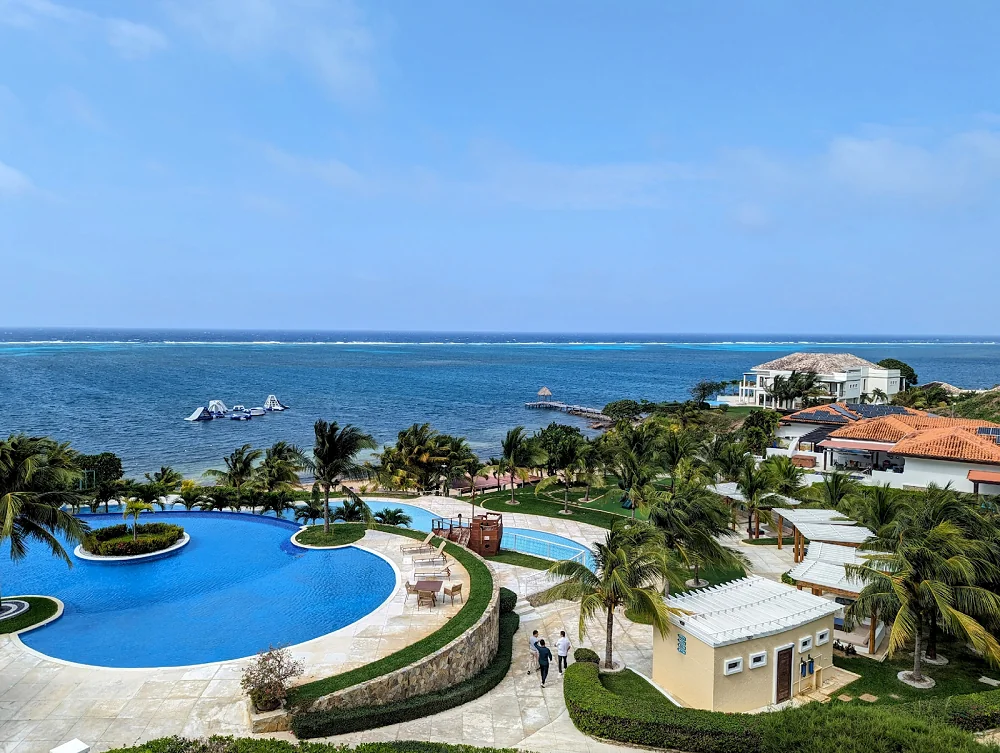
Las Verandas, Vitalia’s beating heart
Vitalia is centered around St. John’s Bay, Próspera’s main hub on the island, and St. John’s Bay’s heart is Las Verandas: a sprawling resort of two-story villas next to a golf course. So, if you wanted to go to Vitalia, you had to rent a room there via the organizers, starting at $1000 a month, or anywhere in the vicinity on your own. Early birds got there in late 2023.
Vitalia takes a lot from Zuzalu’s playbook, such as organizing a string of conferences to attract residents and keep them occupied. Those included a two-part longevity biotech conference (read our coverage of the second part), a conference on startup societies, and a couple more. The conferences saw a lot of star appearances, including Bryan Johnson, Balaji Srinivasan, and Aubrey de Grey.
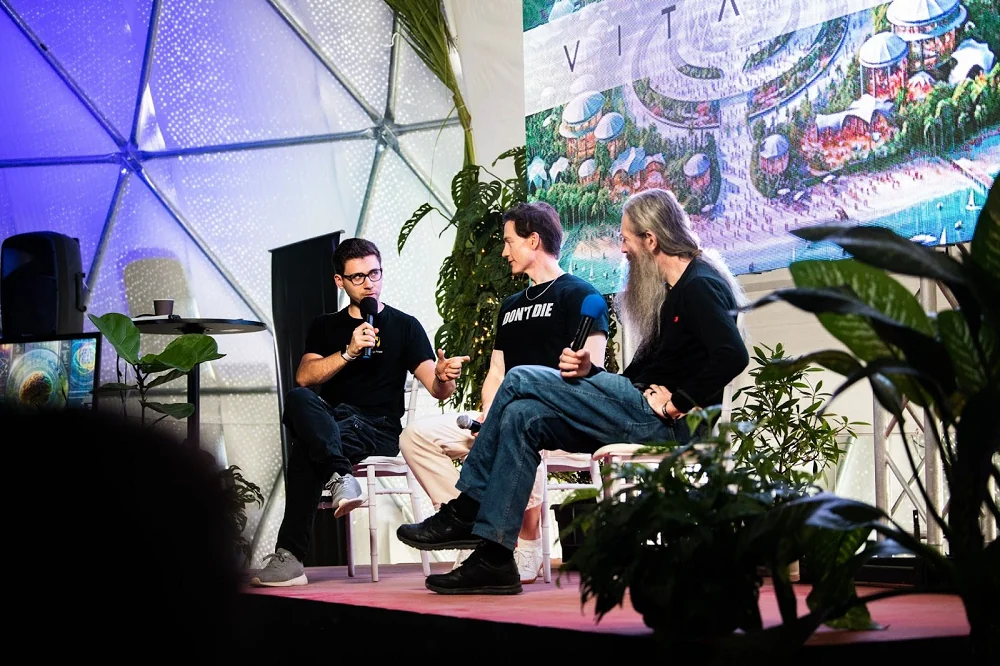
Left to right: Laurence Ion of VitaDAO, Bryan Johnson, and Aubrey de Grey in Vitalia. Source: VitaDAO
When I flew in for my two-week stint in Vitalia, there wasn’t a lot to do there. It was a “slow week” – a major departure from Zuzalu’s idea of constant action. It felt unfamiliar at first but reflected Vitalia’s ethos of permanent presence. If people live here, they should be able to get some work done. Even in the absence of official events, there was a constant hum of activity, with inhabitants making themselves busy.
What do longevity people do when they gather in one place? They go to the gym. A lot. And they feel mild peer pressure to do so (I did). They take cold plunges (I didn’t). They do yoga on the beach at 7 AM (not a chance, when will the world leave us night owls alone?) Then, there are more classes for all kinds of healthy stuff. Then, a biohackers’ meeting. Then, a lecture on aging biology. Then, meditation on the pier in full view of the gorgeous Caribbean sunset. Then, a party at a villa where you welcome back all the calories you burned during the day.
Jokes aside, no one seems to know for sure how a semi-permanent longevity-oriented community should function. At times, Vitalia felt a bit chaotic and not entirely settled on itself.
I must confess that, at first, I had the feeling that, having traveled that far, I was somehow entitled to being taken care of, entertained. When I sat down to speak with Niklas Anzinger and another Vitalia cofounder, Laurence Ion of VitaDAO, this was one of the topics we discussed.
Laurence, who was a leading figure in Zuzalu, doing loads of insanely hard work there, said that after that, he “vowed that he’d allow people to self-organize” and that in Vitalia, he wanted to “encourage the community to own more aspects of Vitalia’s everyday functioning instead of the organizers picking up the mantle”.
“I think,” I mused in a bout of self-criticism, “that despite us wearing those cool bracelets that say ‘BUILDER’ on them, many people, including myself, feel more like guests. We expect to have certain things, and we complain about not getting them instead of rolling up our sleeves and rising to the challenge.”
To be fair to Vitalians, it was more nuanced than that. As I said, many activities were self-organized, and many problems were being solved collectively. I suspect that the spirit of self-organization will grow stronger as Vitalia transitions toward continuous occupancy.
Kia Winslow of BioAge, also a Zuzalu veteran who came to Vitalia for the second biotech conference, reminisced: “I arrived in Zuzalu during the first week, and I would say that in the very beginning, nobody had a clear understanding of what was going on. Everybody was excited, but nobody knew what to expect, and within the first couple of weeks, people started to self-organize and create events and spaces, and there was a schedule, maps, and everything. I was watching this pop-up city growing and building itself. I think Vitalia is basically a continuation of this process.”
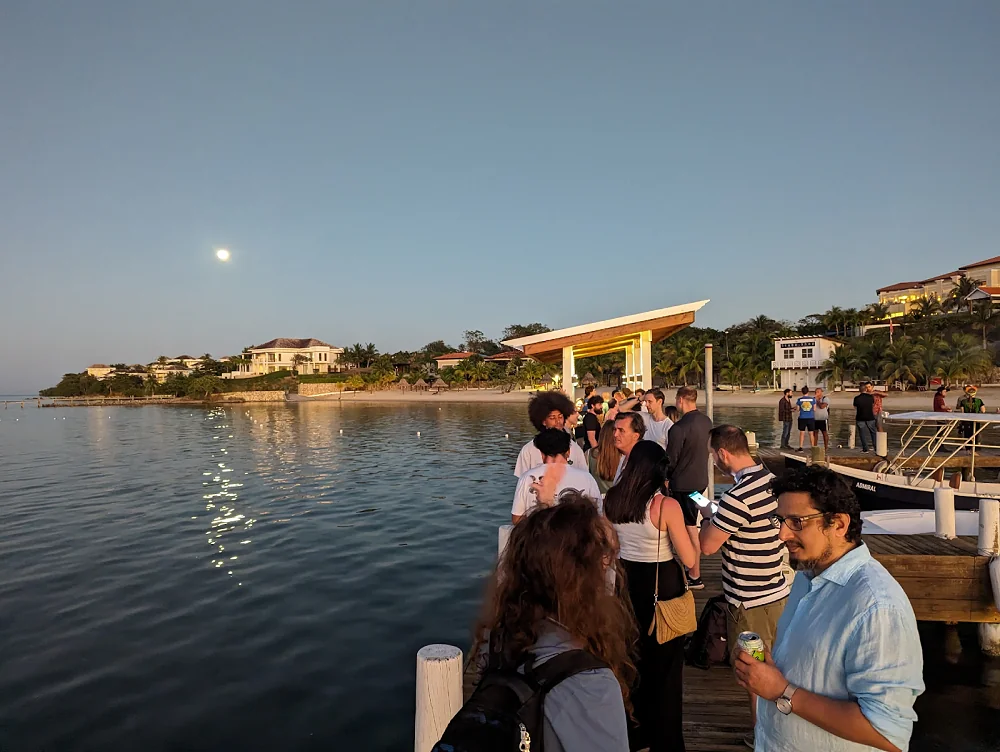
Vitalians hanging out on the pier chugging on complimentary booze
The business of longevity
With all the cool stuff going on and with the innumerable distractions Roatán had to offer (snorkeling at the world’s second-largest reef, petting sloths, swimming with dolphins, and so on), it was not easy to pick up Vitalia’s business pulse. But it was there big time, producing new connections, collaborations, and even startups.
Bringing Vitalia to Próspera proved to be a fateful decision. “There’s an enormous number of projects coming out of this,” Niklas said. “We have a start-up investment program that 40 startups have signed up to. Some have existed before, but they want to benefit from collaboration with Vitalia. One of the big successes was the Augmentation Lab. They realized they had a lot to gain from partnering with Vitalia because, until now, they were very limited in what they could do, otherwise they’d have to face the FDA. But here, they can make progress much faster.”
Oh, the Augmentation Lab! On one of the first nights, at a party, I encountered a guy with his hand bandaged. He explained to me that he just had a programmable RFID implant placed under his skin. “I’m from Brooklyn,” he said. “I’m going to use it for subway rides.” “Do you realize,” I asked him, “how many conspiracy theories you’ll spawn going in and out of the subway with a wave of your hand?”
Presenting the lab in Vitalia, its founder, Jeffrey “Cassox” Tibbets, said that the idea was “to create the only place in the world offering bespoke implants and cutting-edge body art.” Cassox has been working with cybernetic implants in California for years, but in Vitalia, he saw the potential to do things on a bigger scale, quicker and safer. “We need to have physicians on board to do these things safely,” he said, “and Próspera is the only place in the world where this is possible.” Implants can do much more than open subway turnstiles; for instance, the lab wants to get into the CGM (continuous glucose monitoring) business.

Jeffrey Tibbets and Jason Hartgrave presenting in Vitalia. Now you know what “medical punk” is (read the top headline).
“There are examples beyond the lab that prove that we can successfully attract biotech companies that benefit from doing clinical studies here,” Niklas said. “We had Matter Bio here, Gero, Unlock Bio, Bootstrap Bio, Unlimited Bio. We’re great for companies that are at the stage of product development and thinking about where to launch their clinical trials. They’ve been learning from Minicircle.” A couple of days ago, Niklas published a blog post called “The Ultimate Guide To Biomedical Innovation in Próspera” – the name says it all, so check it out.
Gero, an innovative AI/longevity company, brought several of its people to Vitalia for some off-site fun and ended up seriously considering doing its clinical trials on the island. Gero co-founder Maxim Kholin said to me that Próspera “realized that effective governance creates a lot of value.” Proud of Gero’s “hacking mindset,” he was happy to meet many like-minded investors and entrepreneurs in VItalia: “We have a very similar outlook. If you find something important but done ineffectively, you want to hack it. Próspera has managed to hack regulation and governance. We’re trying to hack aging. I feel that our values resonate with a lot of people here. We’re actively exploring the opportunities that this jurisdiction offers to innovators like us.”
One company created from scratch in Vitalia is Unlimited Bio. Its founders, Ivan Morgunov and Anna Vakhrusheva, won a Vitalia hackathon (there was more than one) for “projects aiming to make death optional, directly or indirectly.” A lofty goal, but there’s a long road ahead. For now, Unlimited Bio plans to roll out a VEGF gene therapy for hair loss and skin aging and look for other prospective gene therapies they can quickly test and deploy, thanks to Próspera’s permissive regulations.
VEGF (vascular endothelial growth factor) does what its name suggests – promotes vasculature growth. Its levels, like those of many other proteins, dwindle with age, and some research shows that bringing them back up improves health and extends lifespan in mice. However, we don’t know if this is a good idea for humans in the long run. Currently, VEGF-blocking therapies are used to treat age-related macular degeneration and some types of cancer. Unlimited Bio says that its VEGF-boosting gene therapy was approved in 2011 in Russia for peripheral arterial disease and has since shown a good safety profile. If that’s enough to assuage your doubts, come to Roatán and give it a go!
This is a good example of how they do things in Próspera. Bryan Johnson, a famous biohacker, actually came to Vitalia to receive a follistatin-boosting therapy from Minicircle, Roatán’s gene therapy pioneer. Follistatin promotes muscle growth and density, which is something Bryan is obsessed with. Like VEGF, follistatin has shown benefits in mice, but human data is limited. In the US or Europe, it would take years to bring these therapies to market, but in Próspera, it’s enough to show some safety data and you can start flying in patients. This is agile and effective at getting medications to people, but I’m sure you will forgive me for retaining some healthy (pun intended) dose of skepticism.
Próspera’s physical hub for clinical trials and therapies is GARM clinic. Already long-running and offering stem-cell-based and other therapies, it has provided inspiration and infrastructure for many projects conceived in Vitalia. When I was invited on a tour, I expected to see a shining medical facility, but it turned out to be much smaller and crampier than I’d imagined. Don’t judge a book by its cover, though: GARM claims a good safety record and, due to growing demand, is set to expand and relocate to Las Verandas, becoming even more accessible to Vitalia residents and companies.
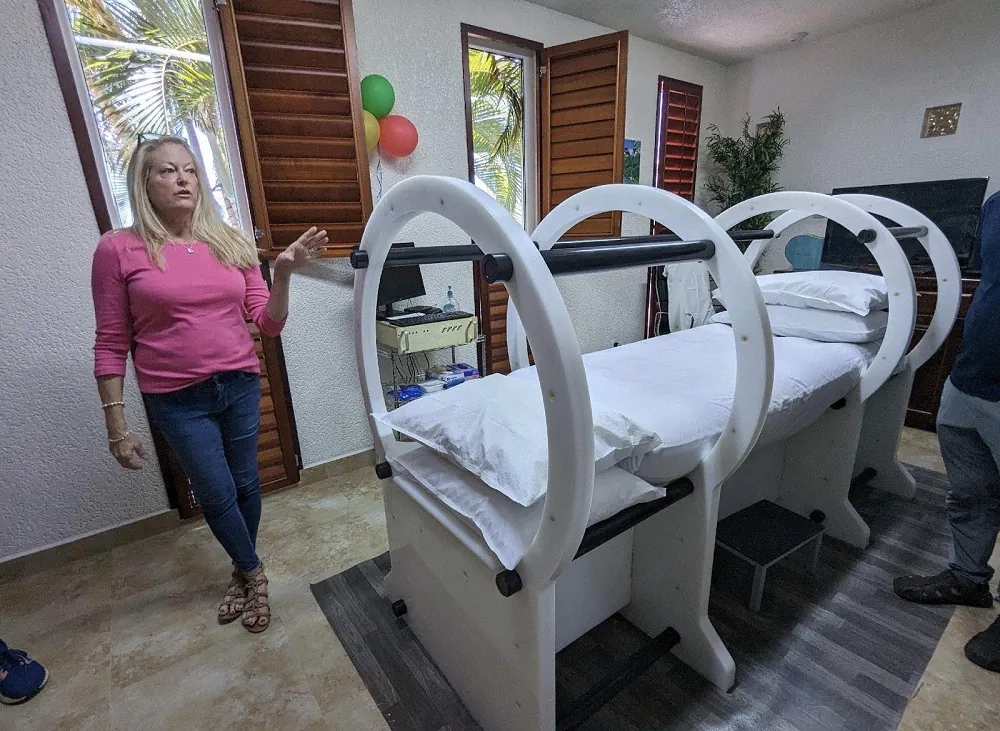
Heather Terry, CEO of GARM clinic, shows us around
Should I stay or should I go?
The second biotech conference was officially Vitalia’s last big event before a long recess. It was quirky and a bit all over the place in terms of topics, but it received high marks from some conference-savvy people, such as Martin O’Dea, Dublin Longevity Summit’s cofounder.
“In some ways, it’s the same as the conferences that are held around the US and Europe, the one we have in Dublin, and a few others,” he said. “But it’s definitely a different vibe, a different atmosphere because people have been here for two months. Every conference is a good opportunity for people to come together and collaborate and work, but here, you’re almost forced to collaborate.”
Martin said that Vitalia’s promise of permanent presence “where scientists and other people within the community can at least partially reside over the course of the year could be a game-changer, a paradigm-shifting type of event, but that’s to be seen. It’s very early days, and I guess this place is going to empty pretty much in the next few days.”
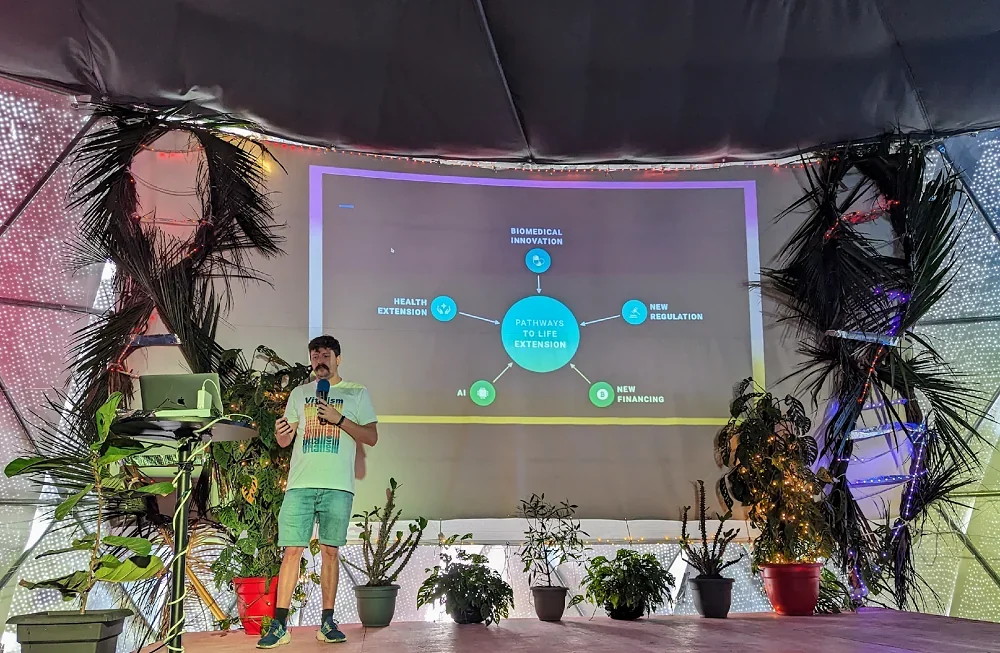
The nonchalant atmosphere of the second biotech conference in Vitalia, with Dr. Max Unfried presenting
Actually, Martin was only half-right. While a lot of people packed their suitcases and left on or around the same day I did, a surprising number remained: 40-50, according to Niklas.
“We want to keep doing things here,” he said. “The goal is to have two hundred permanent residents by year’s end. We’ll announce a schedule for what gives people good reasons to visit.” Some events have indeed been announced since then, and more are on the way.
The plans don’t stop there. Laurence envisions thousands of residents in the next couple of years and, eventually, up to a million. “Hong Kong island is over a million people, and it’s roughly the same size,” he said. Niklas added that they want to have three to five hubs around the world and “an online community that’s about ten times bigger.”
“Why would so many people move in here?” I asked. Laurence’s response was: “Because it’s an amazing life with a high density of like-minded people and one of our few chances to actually accelerate progress and get aging under medical control.” “San Francisco is successful because it has a very high density of aligned people,” Niklas chimed in. “And we were able to replicate that with Vitalia. That’s the reason that many people that came here are staying.”
Niklas and Laurence went as far as to claim that in terms of people, Vitalia was better than San Francisco. To that, I said with a chuckle: “Aubrey de Grey told me in Zuzalu that it would take a lot for him to leave his beloved Bay Area for some distant place.” Niklas smiled back: “Aubrey is a great example. Initially, he was skeptical of Vitalia, but then he liked it here so much that he decided to stay the entire time.”
“I went to Próspera for a few days in November”, Aubrey confirmed to me, “and became totally convinced that it is set to be central to the future of medical tourism, at least in respect of longevity, so I arranged to spend the whole of January and February in Roatán, but in fact had to leave abruptly in early February. Vitalia has thoroughly lived up to the challenge of being a massive step forward in the furthering of innovative longevity medicine. It has fully capitalized on its starting point of being located in Próspera, which has broad legal autonomy and, thus, the ability to eliminate the many obstacles to regulatory approval in established jurisdictions that, in fact, deliver no value in terms of safety or efficacy. Having seen up close what the people at Vitalia are creating, I’m completely convinced that Vitalia is set to become, within only a couple of years, the global hub for longevity pioneers.”
The bottlenecks and the vision
There must be bottlenecks, right? After all, we journalists are constantly looking for bad stuff to report. One problem, according to Niklas, is the perception of Honduras. “It hasn’t reached everyone yet that Roatán is a paradise island and that Honduras can also be very pleasant once you get to know people and you have a way to get around,” he said. What about crime? Laurence noted that “Roatán is unique (for Honduras), and it’s much safer than most US states.”
Still, let me whine just a bit more. Service on Roatán can be subpar. Niklas thinks this might be due to the “tourism economy,” which leads to complacency because “people come to such places anyway.”
“You don’t have Amazon delivery,” Laurence sighed, and I immediately sympathized. For me, it’s a major blow. As an immigrant, one of the things I’m really enjoying in the US is the ability to order virtually anything in the world and have it delivered in no time. Of course, Amazon Prime is just one of a whole lot of nice things to which travelers might be accustomed or addicted but are unavailable on Roatán.
The food options are still limited and not cheap, even the local supermarket (yes, there’s only one in Próspera’s vicinity). Getting healthy and vegan food can be especially challenging. More people means more and cheaper services, Niklas said, but it’s kind of a chicken and egg situation.
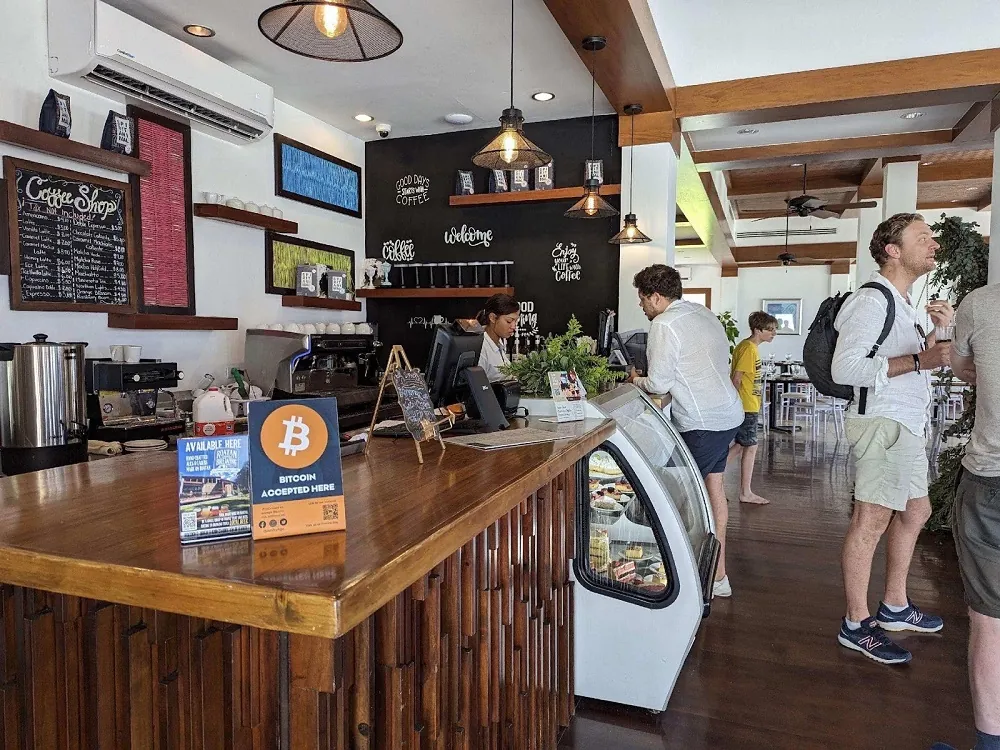
One of only two restaurants in Vitalia. At least they accept Bitcoin!
Accommodation is hard to come by and might be pricey. This will supposedly change with the launch of DUNA, where one would be able to lease an apartment for as little as 500 dollars per month.
Then, there’s Próspera’s image. Not everyone is enchanted by the promise of “governance as a service” and streamlined (too streamlined?) regulation. Many ask themselves, how legit is it? Is their investment of money and effort protected? What about their health? The FDA may be a drag, but it’s good to have its stamp of approval on the therapy you’re about to get.
Niklas, however, sees it as a different path to success: “This approach is not antagonistic to the FDA. We want to do many of the same things when it comes to safety that makes sense and other things differently and still get market approval and access in large jurisdictions or markets, including the US.” Credibility is vital for a nascent enterprise. Niklas and Laurence vow to do everything in their power to gradually build Vitalia’s.
The good news is that Vitalia is not alone. After Zuzalu, there’s been a flurry of activity in the field of network societies, with people collaborating and learning from each other. For instance, a whole software ecosystem is being built, covering such essentials as verification, scheduling, participation, and so on.
Can we safely say that Vitalia is currently the most advanced project in this field? “It certainly is a major evolution in the strategy for a new network society,” Niklas said. “Having land or a jurisdiction first was always challenging. To build an actual society, you need physical space because much of our lives are in the real world.”
He sees Balaji Srinivasan’s strategy of ‘virtual first, physical second’ as a shortcoming: “If you only get good at community, but not at land and governance, you’re really lacking something that you need to succeed. It’s very difficult to succeed as a startup if you don’t build your core strengths from the beginning. So, with Vitalia, we’re the first ones to build a strategy that has both things, land, and community, from day one. I think what we have achieved so far with Vitalia could well be the model for the future.”
According to Laurence, a longevity network society has an even more fundamental need for physical presence because you can develop software online, but you can’t develop treatments that have to pass the scrutiny of large regulatory bodies. Biotech’s very nature requires physical presence and legal autonomy.
A place to come back to
Like many of its participants, I fell in love with Zuzalu swiftly and hopelessly. Was it the same with Vitalia? The second time is probably never the same. I knew what to expect (that’s not to say Vitalia never pleasantly surprised me), so the wow effect was a bit blunted. This is how things mature along the arrow of time: something the longevity field is audacious enough to try to push against.
Why am I even telling you about my feelings? Why go beyond explaining how Vitalia and Próspera work? Because I believe that how people feel about such places is crucial to their success. The incomparable joy of daily interactions with smart, kind, curious, like-minded people was still there. The excitement of soaking in all those cheesy but lovely niceties of a tropical tourist destination – the sea, the sand, the sun, the palm trees, the pools – check!
There was also a new feeling I detected as my plane was climbing up in the skies above Roatán – that I don’t part with this place forever but can and probably will be coming back to a growing, buzzing Vitalia, like people come back to their favorite city or hotel. Not a home away from home, but close. And that’s worth a lot.
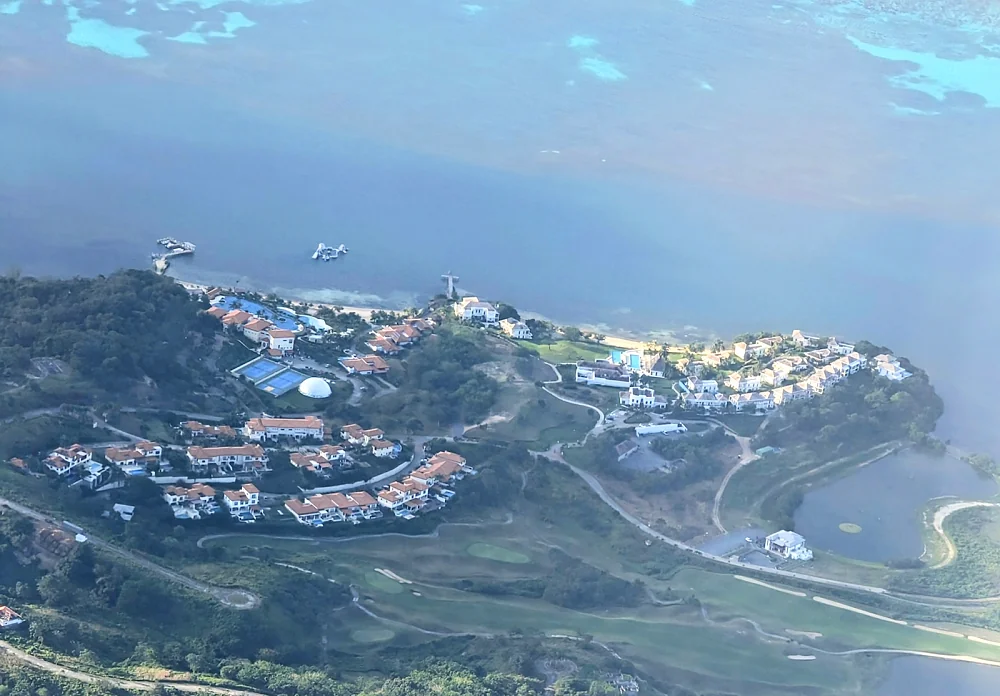
Vitalia, shot from the plane’s window by the author as he was contemplating his feelings towards the place







